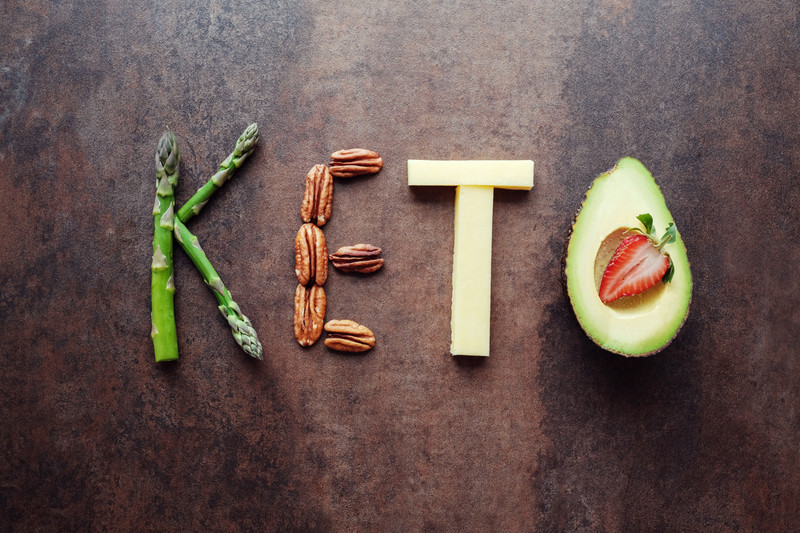The ketogenic (keto) diet has gained popularity for its ability to promote weight loss, stabilize blood sugar, and improve mental clarity. However, due to its low-carb, high-fat nature, some individuals may experience digestive issues such as bloating, constipation, or an imbalance in gut bacteria.
Maintaining good digestive health on keto is essential for absorbing nutrients, preventing discomfort, and supporting overall well-being. In this blog, we’ll explore the common digestive challenges on keto and how to maintain a balanced gut while following a low-carb lifestyle.
Common Digestive Issues on a Keto Diet
Switching to a low-carb, high-fat diet can impact digestion in several ways:
- Constipation – A lack of fiber from fruits and whole grains can slow digestion.
- Bloating and Gas – Some keto-friendly foods, such as sugar alcohols and dairy, can cause bloating.
- Keto Flu Symptoms – Initial shifts in gut bacteria may lead to digestive discomfort.
- Imbalance in Gut Microbiome – The reduction in prebiotic fiber intake can affect beneficial gut bacteria.
Fortunately, these issues can be prevented or managed with simple dietary adjustments and the right supplements.
Tips for Maintaining Digestive Health on Keto
1. Prioritize Fiber from Low-Carb Vegetables
Since traditional high-fiber foods like grains and beans are restricted on keto, it’s important to get fiber from low-carb vegetables to support digestion.
Best Keto-Friendly Fiber Sources:
- Leafy greens (spinach, kale, arugula)
- Broccoli and cauliflower
- Zucchini and cucumbers
- Avocados (also rich in healthy fats)
- Chia seeds and flaxseeds
Eating fiber-rich foods can help prevent constipation and promote regular bowel movements.
2. Stay Hydrated to Prevent Digestive Sluggishness
A lack of water intake can contribute to dehydration and slow digestion. Since keto can have a diuretic effect, staying hydrated is crucial.
Hydration Tips:
- Drink at least 8–10 glasses of water daily.
- Include electrolytes (sodium, potassium, magnesium) to replenish minerals.
- Sip on bone broth or herbal teas to support digestion.
3. Support Gut Bacteria with Probiotics
The keto diet may alter gut microbiota, making it essential to replenish beneficial bacteria with probiotic-rich foods or supplements.
Best Probiotic Foods on Keto:
- Fermented vegetables (sauerkraut, kimchi, pickles)
- Full-fat yogurt and kefir (if dairy is tolerated)
- Miso and tempeh
- Probiotic supplements for consistent gut support
Recommended: DC Labs Super Probiotic – A high-quality probiotic supplement designed to support digestion, gut balance, and overall well-being on a keto diet.
4. Eat More Prebiotic Fiber for Gut Health
Prebiotics are non-digestible fibers that feed beneficial gut bacteria, promoting a healthy microbiome. Since many high-prebiotic foods are carb-heavy, keto-friendly options include:
- Garlic and onions
- Asparagus
- Dandelion greens
- Leeks
- Chicory root
Adding prebiotic fiber ensures probiotics can thrive, helping prevent bloating and digestive discomfort.
5. Incorporate Digestive Enzymes for Fat Metabolism
Since keto is high in fats, some people experience difficulty digesting large amounts of fatty foods. Digestive enzymes can help break down fats, proteins, and carbohydrates, reducing bloating and discomfort.
Recommended: DC Labs PanZyme-HCl – A blend of enzymes to support efficient digestion and nutrient absorption.
6. Limit Sugar Alcohols and Artificial Sweeteners
Many keto-friendly snacks contain sugar alcohols like erythritol and maltitol, which can cause bloating and gas. While they don’t raise blood sugar, they can ferment in the gut and disrupt digestion.
Better Keto-Friendly Sweetener Alternatives:
- Stevia
- Monk fruit
- Small amounts of raw honey (if your carb intake allows)
7. Listen to Your Body and Adjust Accordingly
Every digestive system is unique. If you notice discomfort with certain keto foods, try:
- Eliminating problematic foods (e.g., dairy, sugar alcohols, nuts)
- Eating smaller, more frequent meals to avoid overwhelming digestion
- Adding more fiber and probiotics gradually instead of all at once
A Note from Us
The keto diet can be incredibly beneficial for weight loss and energy levels, but maintaining good digestive health is essential for long-term success. By focusing on fiber-rich vegetables, hydration, probiotics, and digestive enzymes, you can support your gut while enjoying the benefits of a low-carb lifestyle.

